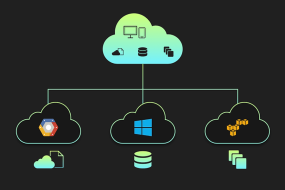
In the ever-evolving landscape of technology, the use of cloud solutions has become a critical component for businesses striving for success. As we step into 2023 and beyond, it’s imperative for tech enthusiasts and business owners to harness the power of cloud hosting and leverage its benefits. This comprehensive guide will delve into the intricacies of cloud solutions and why they are crucial for the modern business ecosystem.
The Evolution of Cloud Solutions
Over the past decade, cloud technology has witnessed remarkable growth, transforming the way businesses operate. It has come a long way from being a mere buzzword to becoming an indispensable asset for enterprises. Cloud solutions offer a wide array of advantages, making them the cornerstone of modern business operations.
The Benefits of Cloud Hosting: Why Businesses Should Consider Cloud Solutions
Scalability
One of the key advantages of cloud hosting is its scalability. Businesses can effortlessly scale their infrastructure up or down to meet their evolving needs. This flexibility ensures that you pay only for the resources you use, making it cost-effective and efficient.
Reliability
Cloud solutions are backed by redundant systems, ensuring maximum uptime. The reliability of cloud hosting reduces the risk of downtime, which can be detrimental to business operations. Your data and applications are secure and accessible at all times.
Cost-Efficiency
Traditional IT infrastructure can be expensive to maintain. Cloud hosting eliminates the need for substantial upfront investments in hardware and software. This cost-efficient approach allows businesses to allocate resources more strategically.
Security
Cloud service providers prioritize security, investing in robust measures to protect data. With encryption, regular updates, and dedicated security teams, your business data is safeguarded against threats and breaches.
Accessibility
Cloud solutions enable remote access to your data and applications. This level of accessibility empowers businesses to adopt flexible work arrangements, enhancing productivity and employee satisfaction.
Disaster Recovery
Cloud hosting offers robust disaster recovery options, ensuring that your data is safe even in the face of unforeseen events. This capability can be a game-changer for business continuity.
Environmental Impact
Cloud solutions are environmentally friendly, as they enable resource optimization and reduced energy consumption. By utilizing shared infrastructure, businesses can reduce their carbon footprint.
How to Choose the Right Cloud Solution for Your Business
The key to reaping the benefits of cloud hosting is selecting the right solution for your specific needs. There are three main types of cloud hosting: public, private, and hybrid. Each has its own set of advantages and limitations, so choosing the best fit for your business is essential.
- Public Cloud : This is a cost-effective option, ideal for startups and small businesses. Resources are shared with other users, making it a budget-friendly choice.
- Private Cloud : Private cloud hosting offers dedicated resources for your business, providing enhanced security and control. It is suitable for larger enterprises with specific compliance requirements.
- Hybrid Cloud : A hybrid cloud combines aspects of both public and private hosting, offering a flexible approach to cater to different needs within the same organization.
Migrating to the Cloud: Best Practices
Migrating to the cloud is a significant step for any business. It’s crucial to plan and execute the transition methodically to ensure a seamless experience. Here are some best practices:
- Assessment and Planning : Start with a comprehensive assessment of your existing infrastructure and identify the workloads suitable for migration.
- Data Migration : Plan the migration of data carefully, ensuring minimal disruption and data integrity.
- Testing : Thoroughly test your cloud environment to address any issues before going live.
- Security : Implement robust security measures and compliance protocols to protect your data in the cloud.
Final Words
In a tech-driven world, leveraging cloud solutions is no longer an option; it’s a necessity for businesses that aim for success in 2023 and beyond. The benefits of cloud hosting, including scalability, reliability, cost-efficiency, security, accessibility, and more, make it an indispensable tool for modern enterprises.
Commonly Asked Questions
1. Is cloud hosting suitable for all types of businesses?
Yes, cloud hosting is versatile and can benefit businesses of all sizes and industries. The choice of cloud solution may vary based on specific requirements, but there’s a suitable option for everyone.
2. How do I ensure the security of my data in the cloud?
Cloud service providers invest heavily in security measures, but you should also implement your own security protocols and compliance standards to safeguard your data.
3. What are the cost implications of migrating to the cloud?
Migrating to the cloud can be cost-effective due to reduced infrastructure expenses and scalability, but it’s essential to plan your migration strategy to optimize costs.
4. Can I switch between different types of cloud hosting?
Yes, it is possible to switch between different types of cloud hosting if your business needs change. This flexibility is one of the key advantages of cloud solutions.
5. How can I assess which cloud solution is best for my business?
To determine the best cloud solution, consider factors such as your business size, compliance requirements, and scalability needs. Consulting with cloud experts can also provide valuable insights.
Advertisement







